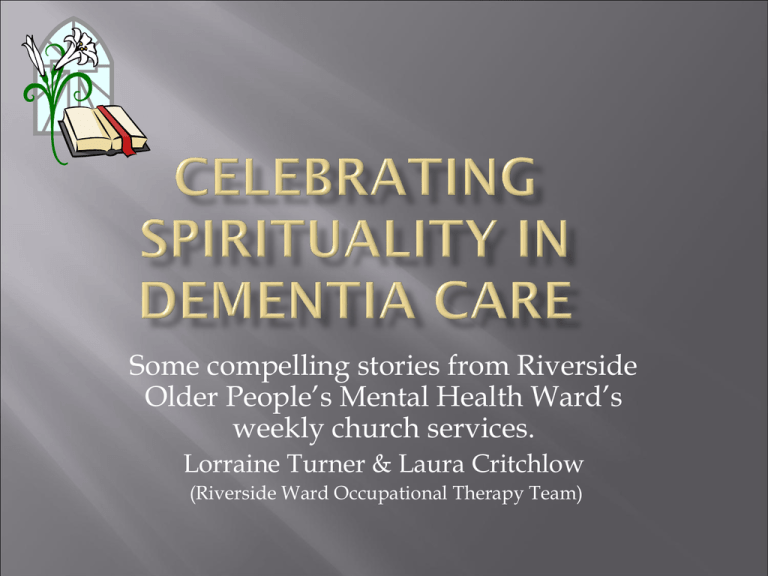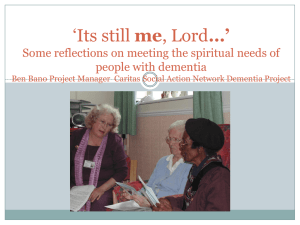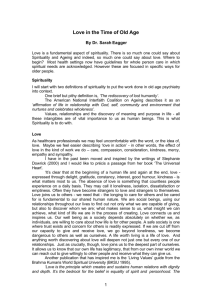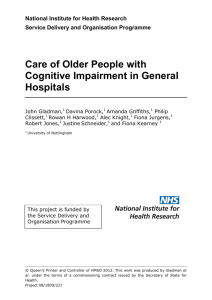Celebrating Spirituality in Dementia
advertisement

Some compelling stories from Riverside Older People’s Mental Health Ward’s weekly church services. Lorraine Turner & Laura Critchlow (Riverside Ward Occupational Therapy Team) Hello we are part of the Occupational Therapy Team who work on Riverside. We help our chaplain Lida provide a weekly church service for our patients. We have been facilitating the weekly church service for approximately 18 months. Riverside is an 18 bed Older People’s Mental Health Assessment Ward, serving the older population of the Derbyshire Dales. As Occupational Therapist's one of our primary aims is to help people participate in activities of everyday living in order to promote their health & well being. This is achieved by careful analysis of physical, environmental, psychosocial, spiritual, mental and cultural factors to identify barriers to participation. Not experts Answers /solutions Share our experiences of promoting spiritual care needs on Riverside Ward and then together we might consider & explore ways of supporting colleagues in our care homes and other care environments both to recognise the importance of and meet the spiritual needs of those older people in their care. - the search for meaning & purpose in life, which may or may not be related to a belief in God or some form of higher power. For those with no conception of supernatural belief, spirituality may relate to the motivating life force, which involves an integration of the dimensions of mind, body & spirit. This personal belief/faith also shape an individuals perspective on the world & is expressed in a way he/she lives life. Therefore spirituality is experienced through connectedness to God/higher being &/or by one’s relationship with self, others or nature. (Johnson Mayers 2005) Beneath this increasingly jumbled layer of emotion is the true self that remains intact despite the ravages of dementia. This is my spiritual self or transcendent self. It is the ‘me’ that relates to the beauty of a garden, of the leaves or flowers; it is the ‘me’ that relates to God; it is my spirit, the essence of me.‘Christine Bryden (2005) In Dementia ‘Memory may have faded, but something of the past is known; identity remains intact, because others hold it in place; thoughts may have disappeared, but there are still interpersonal processes; feelings are expressed and meet a validating response. In simple terms personhood is “a standard or status that is bestowed upon one human being, by others, in the context of relationship and social being.....implying recognition respect & trust. Good dementia care aims to maintain personhood in the face of face of failing mental powers”. (Kitwood T (1997). Dementia Reconsidered: The Person Comes First. Open University. Dementia affects cognitive skills and ability to effectively communicate – therefore an individual might struggle with the more complex activities /interactions but may have an enhanced appreciation of the simple aspects of their life such as nature or listening to music. Therefore important that as health professionals we take the time to find out from carers what things were meaningful to the person so that we can then try to provide appropriate spiritual care to meet their needs. Historically spiritual care has been identified as a role for chaplains Rev Dr Lida Ellesworth is our hospital chaplain – provides service sheets. Arrives every week and joins in with our introductions and an initial activity. She then proceeds with our service. She also where appropriate offers individual prayer. No organist? Not a problem. CD’s easy solution we have Kevin Mayhew Hymns old/new from Anglican shop. com; but there are a number available. Invite patient‘s to participate We try very hard to gain informed consent with our patients. At times this can be quite difficult especially with very impaired individuals. ‘Seeking consent is part of a respectful relationship with an older person and should be seen as a process, not a one-off event.’ (Dept oh Health: seeking consent p. 3) Look for other signs that can be reasonably interpreted as agreement to participate. Look at the behaviour / Lida seeks consent a second time to offer communion or a blessing. We believe that we should always note the relationship between a person’s ability to give consent to participate versus the possibility of exclusion. We involve families, both to inform the consent process but also to share positive experiences which their carers can so yearn to hear. Compelling stories help us demonstrate how we deliver care . Enables staff to reflect on the work we have undertaken and especially the relationships made and the outcomes gained for all involved. All the following stories are true but anonymous; however we hope they will illustrate some of the poignant and moving experiences we have encountered as we strive to improve the quality of service we deliver to our patients on our ward. Our first story illustrates how important a person’s faith is and how it can influence their daily life and actions. This is Alice’s story As the disease progresses changes become more marked. The person may now possibly require assistance with many aspects of daily living. They may present with confusion, repetition & also agitation. They may be disorientated to time and place. Risk might also be a significant feature. It is often accepted that insight and judgement are increasingly impaired affecting the person’s personality. Carers often start to struggle at this stage. We should note that in response to significant illness or difficult situations, many people turn to religion as an avenue of support. Our next story we think not only illustrates how the individual valued prayer but also we believe challenges some of the assumptions held around dementia. This is Fred’s story: Bakewell..... Can hardly be described as a multi cultural area however……. Our next story describes the importance for practitioners to inform their knowledge base around multicultural faiths. And we think failure to do so can risk affecting the correct/appropriate outcome for an individual. This is Bert’s story. During the later stages of the disease most people become increasingly frail and likely to eventually become totally dependant upon others for their care. However the dementia experience is very individual. It is likely during this stage that their memory is very affected and they may not recognise everyday items; places or even those very close to them.....often believing they are living in another reality... Windows of reality/recognition . Need to remind care staff & professionals alike that a person’s faith & spirituality is for many one of the most effective coping strategies available to us all. We hope our next story will illustrate the importance of this connection and how faith has the potential even amongst those very impaired individuals to unlock memories and emotions and reconnect the person with meaningful and valued aspects of their lives. ..... Miriam’s story Our weekly services we believe not only provide the opportunity for worship but also helps bring hope and meaning to what some might view as hopelessness and sadness. As demonstrated in our stories we so often connect with the person they were and most definitely we believe still are: e.g. The spontaneous singing of a familiar hymn or prayer. These are such precious & meaningful moments that should be shared and celebrated with everyone. No guarantees but we never stop trying to provide opportunities connect & engage our patients with their spirituality. We hope that other professionals and colleagues may feel that they are able to support the spiritual needs of those in their care. Art and creative activities. Music. Connecting with Nature. Multisensory environments. Everyone’s responsibility Requires confidence - therapeutic self. Nothing to do with learning new skills etc What we have learned is that it is also to do with who WE are; how we perform our interventions is just as important as what we do. Indeed has anyone any compelling stories they would like to share with the group? Has anyone got any views or ideas how we can promote/acknowledge/support others to meet the spiritual needs of those older people who are in our care facilities or who are experiencing the dementia journey?










